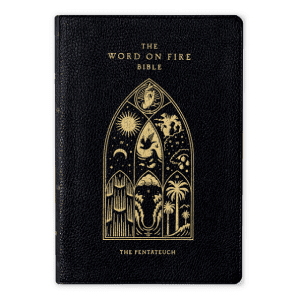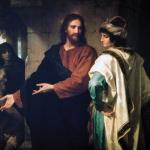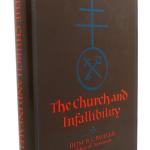I previously reviewed Bishop Robert Barron‘s The Word on Fire Bible, Volume I: The Gospels on 2 June 2020, and the follow-up volume, completing the New Testament, The Word on Fire Bible, Volume II: Acts, Letters and Revelation, on 14 January 2022. The Word on Fire Bible, Volume III: The Pentateuch is, like the others, a beautiful leather-bound Bible (NRSV version), filled with frequent inserts offering commentary (from Church fathers, Doctors of the Church, popes, saints, and other notable exegetes) and beautiful reproductions of great Catholic art. The book page offers a general introduction:
Volume III of The Word on Fire Bible features the first five books of the Old Testament, collectively known as the Pentateuch: Genesis, Exodus, Leviticus, Numbers, and Deuteronomy.
Accompanying the text of Scripture, you’ll find over 90 commentaries from Bishop Robert Barron and over 230 commentaries from mystics, artists, and scholars throughout history. Volume III includes—for the first time in the series—commentaries from Dorothy Day, Ephrem the Syrian, Hildegard of Bingen, Bernard of Clairvaux, and more. This volume also includes over 50 works of art . . .
As I did in my other reviews, I’d like to offer what I think are notable and representative examples of the relentlessly helpful and eloquent commentary, with regard to some of the most well-known stories of the first five books of the Bible. It’s a subject matter very close to my heart, having recently written a book, The Word Set in Stone: How Archaeology, Science, and History Back Up the Bible (Catholic Answers Press: March 15, 2023). About half of its text was devoted to the Torah, or Pentateuch. So I’m personally very pleased with the appearance of this Bible at this point in time.
A gem from the great Catholic apologist and social critic G. K. Chesterton (1874-1936), from his book, Orthodoxy (1908) appears at Genesis 3, which chronicles the fall of man, or original sin:
Modern masters of science are much impressed with the need of beginning all inquiry with a fact. The ancient masters of religion were quite equally impressed with that necessity. They began with the fact of sin — a fact as practical as potatoes. . . .
But certain religious leaders . . . have begun in our day . . . to deny the indisputable dirt. Certain new theologians dispute original sin, which is the only part of Christian theology which can really be proved. Some [people] in their almost too fastidious spirituality, admit divine sinlessness, which they cannot see even in their dreams. But they essentially deny human sin, which they can see in the street. (pp. 58-59)
Bishop Barron offers fascinating and thought-provoking analogies in his commentary on Noah’s ark:
The careful description of the building of the ark and the delineation of its proportions point forward to similar accounts of the construction of the tabernacle in the desert during the Exodus and of the Jerusalem temple. . . .
In his City of God, St. Augustine reads the history of salvation, from biblical times through the era of the Church, as a tale of Noah’s ark — the little ship, filled with a holy remnant, bouncing on the waves of the stormy sea.
And this is why the medieval architects also endeavored to make the cathedrals look like great ships. The nave (from the Latin navis, meaning “boat”) is surrounded by high walls, which in turn are supported by flying buttresses, which look, for all the world, like oars coming out the side of a ship. . . . The idea is that the Church is Noah’s ark, moving through the stormy waters of sin, the place of safety into which sinners have been called. So the Church is shelter from the storm, a boat tossing on the waves of a dysfunctional world. (pp. 77-78)
Bishop Barron again provides a magnificent commentary on “The Binding of Isaac”: the story where God commands Abraham to sacrifice his son Isaac (Genesis 22), that baffles many pious, observant Christians as well as Jews; which he describes as “the most terrifying story in the Old Testament”:
If you don’t feel some dark anguish upon hearing this story, you haven’t been paying attentions; if there isn’t some anger welling up in you, you haven’t grasped the disturbing core of the narrative. . . . Abraham, in sacrificing his son, was actively willing the impossible, something the mind can’t contain. Until we have experienced something of this intellectual vertigo, we haven’t allowed the story to grasp us adequately.
This terrifying narrative is one of the most vivid displays of a paradoxical principle that can be found from the beginning to end of the Bible — namely, the law of the gift. This spiritual maxim can be stated simply: your being increases and is enhanced in the measure that you give it away. And its corollary can be expressed with equal simplicity: your being decreases to the point of annihilation in the measure that you cling to it. . . .
What is Abraham willing to give away? That which he loves the most, the son of his old age, the child of promise. And the result is the increase of his being. . . . We all must identify that which we love the most and then make of it an offering to God, and we will receive it back multiplied thirty, sixty, or a hundredfold. . . .
Like Abraham, the heavenly Father was willing to give away what was dearest to him . . . (pp. 141-143)
For my next sampling, I go to the famous appearance of God to Moses in the burning bush (Exodus 3). Pope Francis is cited, from a General Audience of June 25, 2014, making a point concerning how God’s words tie into the necessity of sacred tradition:
[H]e defines himself as “the God of your ancestors.” He doesn’t say: I am the Omnipotent One . . . no: “I am . . . the God of Abraham, the God of Isaac, and the God of Jacob.” In this way he reveals himself as the God who made an alliance with our fathers and remains ever faithful to his pact, and calls us to enter into this relationship which precedes us. . . .
[O]thers, before us, lived the faith and then transmitted it to us. We have received the faith from our fathers, from our ancestors, and they have instructed us in it. (p. 273)
A wonderful observation by Pope St. Gregory the Great (540-604), comparing the two Testaments, appears in conjunction with Exodus 22:1:
Some people consider the commandments of the Old Testament stricter than those of the New, but they are deceived by a short-sighted interpretation. In the former, theft, not miserliness, is punished: wrongful taking of property is punished by fourfold restitution. In [the latter], the rich man is not censured for having taken away someone else’s property, but for not having given away his own. He is not said to have forcibly wronged anyone, but to have prided himself on what he received. (p. 368)
I love Dr. Mary Healy’s accessible and informative “Introduction to Leviticus” (pp. 442-445). Here are some highlights:
Leviticus: that proverbial book in which the best-laid plans to read the whole Bible cover to cover come to a grinding halt. The resolute reader immediately finds himself immersed in arcane details of animal sacrifice and instructions on what to do with the blood, entrails, and other body parts. What in the world could this ancient manual of sacrifice have to do with faith or the spiritual life today?
Yet when its secrets are unlocked, Leviticus is a powerfully moving book. . . . Curiously, in Jewish tradition this book was the first that children would study in the synagogue. Perhaps there was a sense that children are naturally attuned to the holy awe that Leviticus evokes. . . .
God proceeds to give Moses his instructions on how his people are to live in covenant fellowship with him, first in their worship (chapters 1-16) and then in their moral conduct (chapters 17-27). To us, the instructions seem strangely external . . . But as the Letter to the Hebrews explains, all these regulations for the body were a provisional arrangement, imposed “until the time comes to set things right” (Heb. 9:10). . . .
God’s holiness is a difficult lesson for human beings to learn. . . . We take sin lightly. Much of Leviticus, like the rest of the Old Testament, is God’s patient pedagogy in which he unveils the dazzling light of his holiness, and in that light, the ugly, devastating darkness of sin.
These excerpts provide, I think, a good idea of the innumerable treasures to be found in this volume. As the Word of Fire book page explains, this Bible is “designed for people reading the Bible seriously for the first time, who may be unsure of what to make of its many events and characters.” And it approaches Holy Scripture “from the heart of the Church.” Anyone who reads the commentaries alongside the Old Testament will have a greater appreciation and comprehension of the often misunderstood Hebrew Bible, and how, especially, it sets the groundwork for, and relates to Christianity. The Word of Fire Bible will cause folks to “catch on fire” for the faith!
I give it my highest, most enthusiastic recommendation. Bravo! to Bishop Barron and to everyone else who participated in this worthy endeavor.
***
***
Photo credit: from the book page for this Bible on the Word of Fire website.
***
Summary: Bishop Barron’s Word on Fire Bible (The Pentateuch), is a wonderful, beautiful, educational, and historically fascinating volume. I give it my highest recommendation!














